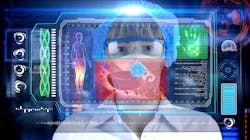The health-care sector has been one of the last sectors to innovate, leverage emerging technology, and prepare for Industry 4.0. But with the onset of the COVID-19 pandemic, doctors, dental clinics, and hospitals must now expedite their journeys.
Companies are now welcoming a more resilient, agile, technology-driven workforce that is a result of the pandemic and remote working. Going back to the previous ways of working seems implausible now.
Data-based solutions
Understandably, society’s health-care concerns drastically rose in the first half of the year. Faced with a global pandemic, we all realized that family, freedom, and health are absolute priorities. Since the 19th century, the world has operated under a “sick-care” system, which means you are attended to by a medical professional when you’re ill or in a medical emergency. But with the amount of data we have access to now, it’s time to advance into a better, more preventive health-care system.
Globally, due to the pandemic panic, we’re seeing an increase in precautionary testing for suspected medical conditions to identify an illness or condition from the get-go. This can crowd medical facilities, which is why wearable technologies and at-home kits for infancy-stage conditions are being issued. They create a wealth of information about the body, identifying sleep patterns and monitoring heart rates to help get ahead of the curve and create predictive data.1 This is creating a large health-care database for tech specialists to use, within privacy confines, to create solutions and optimize current resources. Their work will prepare us for the next pandemic or reduce risk greatly.
Tele-everything
Teleconsultations, teledentistry, and, telehealth—they were a thing of the future. But they are very much in use now as the virus introduced a key plot twist: social distancing. It inspired medical professionals to get creative with their offerings and understand the various uses of artificial intelligence and technology within the field to reach patients.2 Teleconsultations can be used as a preliminary evaluation to advise patients on the next steps, eliminating the need to come to the clinic.
Nurse-led triages
Primary care is now becoming the focus of public health. Nurse-led triaging puts a nurse as the first point of contact for patients when they enter a medical facility. Nurses can assess the level of medical attention needed, possibly eliminating the need to meet a general physician altogether.
Health-care regulators must invest in the future of primary care and help hospitals and clinics develop their nurse-led triage services to ensure patients are seen in a timely manner.3 This allows general physicians to be available for critical cases and also offers nurses the opportunity to develop their responsibilities within their practices.
Building your community
Customer service is key during these trying times. As we emerge from lockdowns and return to a new reality, the health-care sector’s customer service has an even more significant role to play. With teleconsultations and more phone-based interactions, patients require empathetic experiences. Even though the future is digital, it’s important we continue to find ways to humanize experiences.4
The wellness factor
Creating team-building activities boosts engagement and encourages a mentally healthy environment. UC Davis Health in California introduced a “wellness officer” to oversee employee health and well-being by launching team-building activities, streamlining monotonous chores and preventing burnout.5 Building immunity and encouraging optimism in the workplace will allow for fewer sick days and more benefits for employers overall, which includes a productive, dedicated workforce and a more coherent team.
We’re long overdue for this realization—we’ve overworked our global ecosystem. We’re being compelled to stop and reset priorities across various sunrise industries, especially the health-care field. It’s time to recognize the role technology plays in our development and the many ways we can provide better, customized care for individuals.
References
1. Waldron T. Top 8 healthcare trends in 2020. Definitive Healthcare. February 5, 2020. https://blog.definitivehc.com/top-8-healthcare-trends-2020
2. Global Innovation Index. 4 ways data is improving healthcare. World Economic Forum. December 5, 2019. https://www.weforum.org/agenda/2019/12/four-ways-data-is-improving-healthcare/
3. Marshall S. How AI is transforming the future of healthcare. International SOS. https://www.internationalsos.com/client-magazines/in-this-issue-3/how-ai-is-transforming-the-future-of-healthcare
4. Atchison J. 5 ways to humanize your chatbot. Inc. March 20, 2019. https://www.inc.com/young-entrepreneur-council/5-ways-to-humanize-your-chatbot.html
5. Gooch K. How 10 hospitals, health systems promote employee well-being. Becker’s Hospital Review. November 21, 2018. https://www.beckershospitalreview.com/hospital-management-administration/how-7-hospitals-health-systems-promote-employee-well-being.html
MAGED EL-MALECKI, DMD, is the founder of Boston Dental Clinic. In 2018, the clinic launched its teledentistry platform, where patients can receive options for treatment and expert advice over the phone or by email, saving them time and money. For media engagements or speaking inquiries, please contact Dr. el-Malecki’s brand manager, Sandra Flood, at [email protected].
About the Author
Maged el-Malecki, DMD
MAGED EL-MALECKI, DMD, is the founder of Boston Dental Clinic. In 2018, the clinic launched its teledentistry platform, where patients can receive options for treatment and expert advice over the phone or by email, saving them time and money. For media engagements or speaking inquiries, please contact Dr. el-Malecki’s brand manager, Stefanie, at [email protected].
